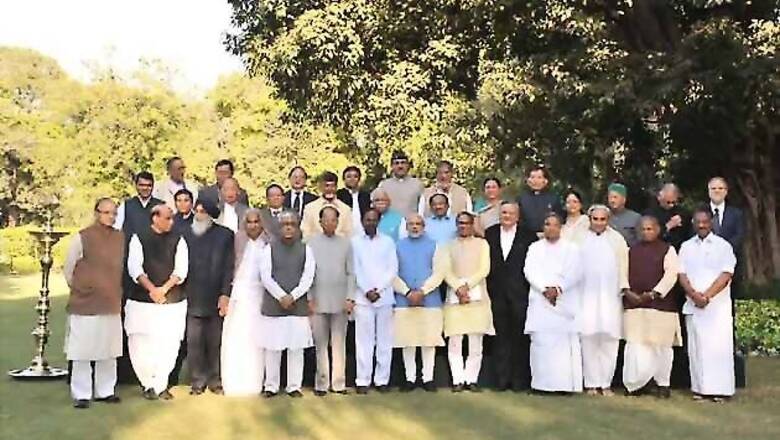
views
New Delhi: A meeting called by Prime Minister Narendra Modi to discuss the future of the Planning Commission on Sunday saw most Chief Ministers favouring restructuring of the Soviet-era body but there was no consensus on disbanding the existing set-up.
Modi, who has announced in his Independent Day speech that the Planning Commission would be replaced by a new body which is in sync with the contemporary economic world, invoked former Prime Minister Manmohan Singh who had said on April 30 this year that the current structure has "no futuristic vision in the post-reform period".
Modi pushed for an effective structure which strengthens "co-operative federalism" and the concept of 'Team India'. Indications from the day-long meeting suggested that the government is looking at a structure which will have the Prime Minister, some Cabinet ministers and some Chief Ministers along with technocrats and experts in various fields.
The Chief Ministers could be included in the body on rotation basis and the states could be given liberty to spend funds according to their needs. Finance Minister Arun Jaitley, while briefing the media on the deliberations of the meeting, said no time-line has been fixed, saying the Centre will take a "considered view after consultations are over".
However, there were indications that the shape of the new structure could be firmed by January 26 next year. Chief Ministers of West Bengal and Mizoram besides poll-bound Jammu and Kashmir and Jharkhand did not attend the meeting where the Prime Minister sought to give greater role for the states in the new body.
At the meeting, Congress-ruled states supported the idea of revamping the Planning Commission set up by Jawaharlal Nehru in 1950 but disfavoured its scrapping as they felt it can be "evolved". However, some NDA states and those ruled by parties like AIADMK and TRS wanted immediate disbanding of the Planning Commission.
The meeting deliberated particularly on four aspects like the fate of five-year plan system, annual plans, the flow of funds from the Centre to states as per current practice. The 12th Five Year Plan (2012-17) is already mid-way and questions were raised at the meeting whether it could continue or not, said the Finance Minister after the formal meeting and 'retreat' where consultations were held between the Prime Minister and Chief Ministers without officials.
The role of knowledge institution and think-tanks in the new body was also discussed thoroughly, amid Modi's keenness to involve technocrats and experts in such an institution. Thrust was laid on this aspect as it will enable the role of private sector in planning and policy making. "Changes were favoured by almost all. But there was a question whether the present structure should evolve or a new structure should be created," Jaitley said.
He said 3-4 Chief Ministers wanted the current structure to evolve. Asked whether they were from Congress-ruled states, he replied: "You guessed it correctly." The Prime Minister told the meeting that the process of policy planning needs to change from "top to bottom" to "bottom to top" while stressing that it was impossible for the nation to develop unless states develop.
The states should have a key role in the new body, Modi said, adding that "states sometimes feel there is no platform to express their views...there should be an effective mechanism to address inter-state disputes." "Can we develop a new mechanism, that plans according to India's strengths, empowers states, and brings on board all economic activity, including that which happens outside the Government," the Prime Minister asked, as he set the tone for the discussion.
Invoking the spirit of "co-operative federalism", the Prime Minister said that the current global scenario offered a chance for India to take a big leap forward. This, he added, was possible by formulating a suitable replacement to the Commission with a view to suitably harnessing the strengths of the country. The Prime Minister said the question of role, relevance and restructuring of the Planning Commission had been repeatedly questioned for more than two decades.
The Prime Minister further said that development is now a priority for all and the time has come to develop a new mechanism to deliver growth and development. Modi also noted that in countries such as the USA, think- tanks that function independently of the government have a major role in policy-making. In India too, he added, there is a great deal of economic activity that happens outside the government set-up, and there is a need to design policies for them as well.
Modi further said that inputs provided by Chief Ministers would help in shaping the structure of the new body to replace the Planning Commission. Amid the Prime Minister's emphasis on decentralisation of power and planning, Jaitley noted that it is "fallacy" that one size fits all in case of implementation of central schemes. There cannot be universal scheme that suits all states. Later the Prime Minister held a retreat, a first of its kind where the Prime Minister and Chief Ministers met without the support of any officials in a relaxed, private setting and discussed developmental issues and specific success stories in their states.
The purpose was to learn from each others' successes so that they could be replicated in other states. Chief Ministers highlighted one area each where they had done something innovative and which had a visible impact, either in improving governance or in improving service delivery to citizens. All the participants felt that this was an extremely useful exercise which could be repeated in future.
The first introspection on the role of Planning Commission was done after the launch of economic reforms in 1992 when it was felt that in the light of changing government policy a different approach was required, the Prime Minister said. Even in 2012, the Parliamentary Consultative Committee had stressed the need for a serious look at the Planning Commission and the need for a new body to replace it.
The Cabinet in its meeting on August 13 approved the repeal of the Cabinet Resolution of March 15 1950 by which the Planning Commission was set up. The Cabinet had also authorised the Prime Minister to finalise the contours of the new institution to replace the Planning Commission.




















Comments
0 comment